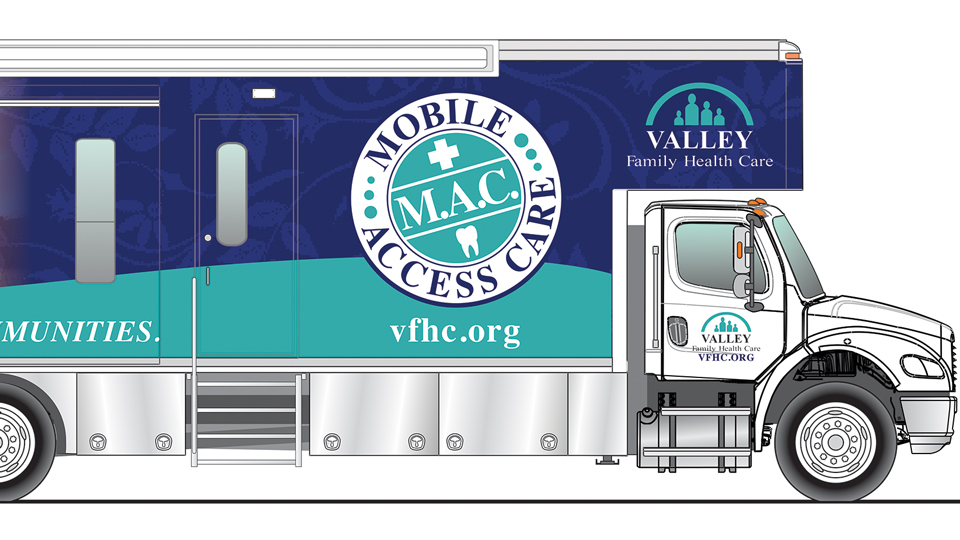
By Mitchell Willetts
The Enterprise
ONTARIO — While it’s not a house call, medical professionals from Valley Family Health Care soon will roll out medical care in distant reaches of Malheur County.
The fast-growing medical provider is about to put a mobile medical clinic on the road, setting up in store parking lots and other places to welcome needy patients.
“More and more people have access to health insurance, but that does not mean they have access to health care,” said Tim Heinze, Valley Family Health’s chief executive officer. With its new half-million dollar traveling complex, Valley Family Health will take medical and dental staff on the road.
“We want to expand access and to take care to where the people are rather than making them come to us,” Heinze said.
Madora Albertson, project manager, said the truck-mounted traveling clinic includes a 30-foot work space for the medical staff. The mobile clinic should be in service by late October.
Once locations are determined, the clinic will show up at designated spots for a few hours, like markets or firehouses, before rolling on to the next stop.
When parked, the clinic can even deploy a slide-out waiting room.
The innovation is one more way Valley Family Health is trying to serve needy patients in Malheur County and parts of Idaho. Valley Family started in 1982 as a migrant health clinic in Payette, and has since grown into six medical clinics, three dental clinics and one outreach center.
Heinze, who took over as executive director in March 2016, has pushed for even more expansion. A new dental clinic opened recently in Payette and the mobile clinic is coming online. He has expanded the staff by 30 and invested in improving existing clinics.
Heinze credits much of the growth to increased access by patients to Medicare and Medicaid, and changes to reimbursement policy.
“We’ve had this perverse system where the more people are sick…the more money the provider makes,” Heinze said. “There hasn’t really been incentive to prevent illness in the first place and to keep people healthy. That’s the direction we’re moving in.”
Increases in Medicare and Medicaid enrollment are particularly noticeable in Malheur County, when one-fourth of the population has incomes that qualify them as impoverished and eligible for federal help.
“I’ve heard of places in the country where there’s a 10 year difference in life expectancy within the same zip code,” Heinze said. “It’s a proven fact that outcomes, morbidity and mortality are a lot worse when you’re disadvantaged.”
For the poorest, even a simple medical checkup can be expensive, and so they often go without. If it’s a choice between food on the table or an afternoon of poking and prodding, the former typically wins. Even as organs are failing or arteries are filling, medical care is put off. The next time they see a doctor, it’s looking up from a gurney wheeling toward the ER.
Running a business specifically designed to serve a community’s most disadvantaged can be challenging, Heinze said. Valley Family Health keep costs low by providing only primary care, and no emergency treatment.
In 2016, Valley Family Health had $9.9 million in revenue, including $4.1 million in government grants. The provider reported on its tax returns that it spent $8.8 million on care. One out of seven patients is a migrant or seasonal worker, and one out of five has no insurance.
Such government support helps insure Valley Family Health can take care of anybody who walks in, regardless of legal or economic status. Nobody is turned away.
“Even if they’re uninsured, we’ll work out a payment plan,” Heinze said.
One out of five coming in the door have no insurance.
“If they can pay just five bucks when they walk in, we’ll work with them,” he said.
Malheur County is considered short of health providers. Simply put, there’s too few medical professionals, and too many who need them.
Ken Hart is the president of Saint Alphonsus Medical Center in Ontario,and knows better than most the challenge of operating a health care facility in Malheur County.
“Our biggest struggle at the hospital and in our clinics is being able to attract and retain local providers,” Hart said.
He said small-town life often doesn’t appeal to medical professionals.
“Many of the folks who work here and live here already have a local connection in some way,” he said.
Poverty is a hurdle as well, Hart said.
Seven out of 10 patients at the hospital rely on federal programs, which provide lower reimbursements than commercial insurers. That compresses earnings for the hospital and other medical providers.
“That makes the area look even less attractive for a physician looking to come and land,” Hart said.
Valley Family Health evades some of that challenge because of the National Health Services Corp. Graduating medical students with loans to pay off can join the corps, work in underserved communities, and get some or all of their student debt forgiven.
About one fourth of Valley Family medical and dental providers use some loan forgiveness program, Heinze said.
We invite you to subscribe and support our local journalism: malheurenterprise.com/subscribe. Thank you.




